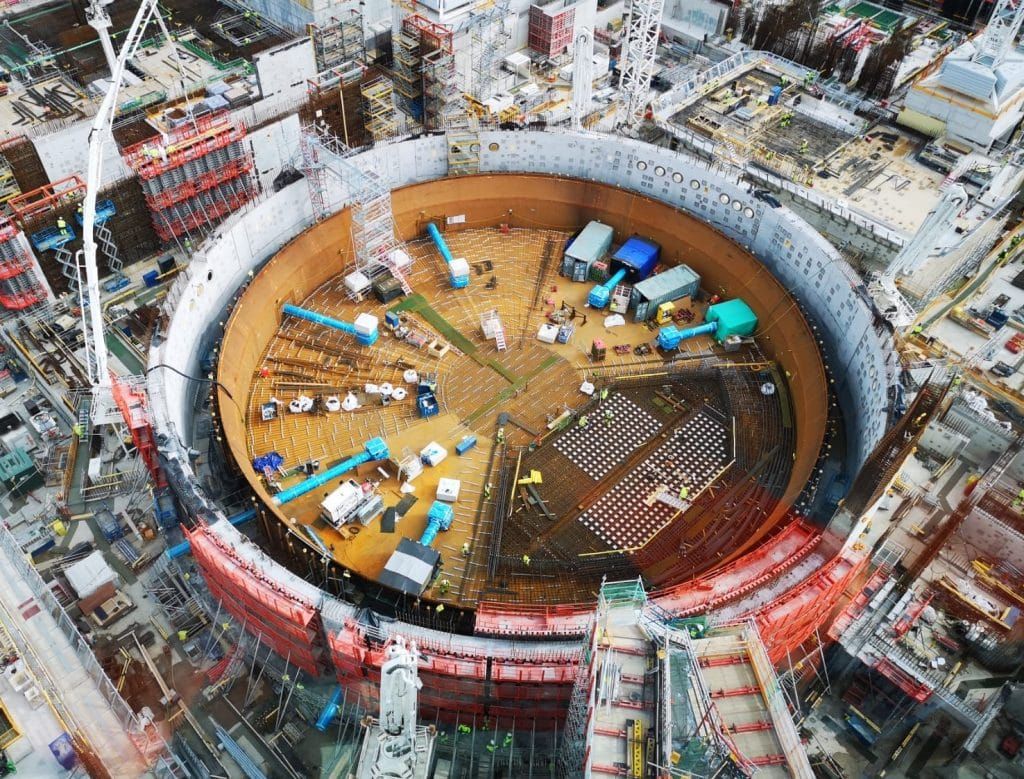Trump’s new foreign investment agency: Itching to build on nuclear quicksand
By Victor Gilinsky, Henry Sokolski | July 17, 2020
 The Hinkley Point C nuclear power station under construction in Somerset, England, 2020. The plant will be built and owned by the French company EDF, but the project is partially financed by the China General Nuclear Power group. Credit: EDF.
The Hinkley Point C nuclear power station under construction in Somerset, England, 2020. The plant will be built and owned by the French company EDF, but the project is partially financed by the China General Nuclear Power group. Credit: EDF.
In 2018 a Republican Congress, with strong Democratic support, created the US International Development Finance Corporation to “provide the developing world with financially sound alternatives to unsustainable and irresponsible state-directed initiatives.” That’s government-speak for competing with China’s Belt and Road initiative. It didn’t take very long, however, for the new agency to fall in line with an irresponsible state-directed initiative of its own—the Trump administration’s all-out effort to encourage nuclear exports.
In June, the agency, whose own rules prohibit financing nuclear exports, proposed to fling the doors open to such financing, without limiting its scope to the agency’s mission to help the economies of the lower income countries with modest, environmentally sensible projects. There is no hint on what sorts of conditions would apply on funding nuclear reactors. Would the country have to have a system of safety regulation? Would it have to meet security requirements? Would it have to allow international inspections? It isn’t even clear whether the agency’s support would be limited to US reactor exports, and therefore subject to the requirements of the Atomic Energy Act’s Section 123 or whether they could also cover equipment purchases from other suppliers. Such details determine whether a federal bureaucracy is constrained to act responsibly, or whether it is free to cater to the latest whims of the White House.
To justify its proposed action, the agency relies on the administration’s ritual talking points—that nuclear exports will “offer an alternative to the financing of authoritarian regimes while advancing US nonproliferation safeguards and supporting US nuclear competitiveness.” These pearls are straight out of the administration’s April 2020 interagency report “Restoring America’s Competitive Nuclear Energy Advantage.”
So are the agency’s assurances that advanced “small modular reactors” and “microreactors” will have significantly lower costs than existing nuclear power plants and “could help deliver a zero-emission, reliable, and secure power source to developing countries, promoting economic growth and affordable energy access in underserved communities.” This is all pie in the sky: None of these plants have been built, and their characteristics and economics are speculative.
But if the proposed change is restricted to small reactors or microreactors, the nuclear industry’s influential registered lobby, the Nuclear Energy Institute, hasn’t heard about it. The Institute’s president crowed her unqualified approval: “The US International Development Finance Corporation’s proposed policy change to lift its legacy prohibition on nuclear energy projects supports the development of clean, reliable energy worldwide, helps countries reach their energy development goals, buttresses US national security, and can help level the playing field for US firms.”
Nor does her response suggest any awareness that the agency’s financing of nuclear projects will be limited to countries in the lower portion of the economic scale. “An increasing number of countries around the world that meet [the agency’s] project criteria are looking to build new reactors or expand existing nuclear energy programs. Without robust financing to encourage partnership with the United States, well-funded, state-owned enterprises from China and Russia are filling this void.”
The agency also announced the change with unusual haste. July 10th marked the end of a 30-day public comment period. The agency’s own rules state that risky projects, say, a large industrial plant, “are disclosed to the public for a comment period of 60 days.” Under its current rules, nuclear reactors and parts fall in the riskiest category, under “Categorical Prohibitions.” The proposed change involves not one risky project but an entire class of such projects, which would bounce from the forbidden category into the fully acceptable category. But for some reason the agency only saw fit to give half the normal time for public comment.
This whole affair is the latest expression of the administration’s organizing principle for nuclear energy policy—finding ways to loosen rules and to create subsidies to propel nuclear exports. This is supposed to energize the much-diminished domestic nuclear manufacturing sector. Since the whole policy doesn’t make any economic sense, the ultimate argument is based on the dogma: Come what may, we have to head off sales by our adversaries China and Russia.
The administration’s interest in the possible consequences of nuclear exports on the spread of nuclear weapons is pretty much limited to simply asserting, in opposition to all common sense, that nuclear exports, however loosely controlled, support our nonproliferation policies, because other suppliers—China and Russia—would offer even looser conditions. In other words, the administration proposes a race to the bottom.
Here again, the agency parrots the party line: “This change could also offer an alternative to the financing of authoritarian regimes while advancing US nonproliferation safeguards and supporting US nuclear competitiveness.”
The sad part is that the agency really does have a useful function in helping developing societies in healthy ways. And helping to avoid entanglement with China and Russia, fundamentally dictatorial and malevolent regimes, is an important part of that. But the agency’s role will not be fulfilled by imitating those regimes in their sales practices. The only ones who will profit will be the US companies that receive government subsidies.
The agency does have on its books good environmental, social, and economic criteria for evaluating projects. But will they be applied as intended? Its effort to quick march the comment process on changing its rules in a dramatic way, and relying on propagandistic arguments, undermines confidence that they will be adhered to. The agency needs to return to the drawing board to reconsider the terms on which nuclear projects would fit in its portfolio, and whether they do at all.
Congress should closely supervise the project. The BUILD Act that created the agency assigns oversight responsibilities to the Senate Foreign Relations and Appropriations committees as well as the House Foreign Affairs and Appropriations committees (Sec. 1402(1)). They have their work cut out for them.
Together, we make the world safer.
The Bulletin elevates expert voices above the noise. But as an independent nonprofit organization, our operations depend on the support of readers like you. Help us continue to deliver quality journalism that holds leaders accountable. Your support of our work at any level is important. In return, we promise our coverage will be understandable, influential, vigilant, solution-oriented, and fair-minded. Together we can make a difference.
Keywords: 123 agreement, US nuclear policy, finance, nuclear energy, nuclear industry
Topics: Nuclear Energy, Opinion
















